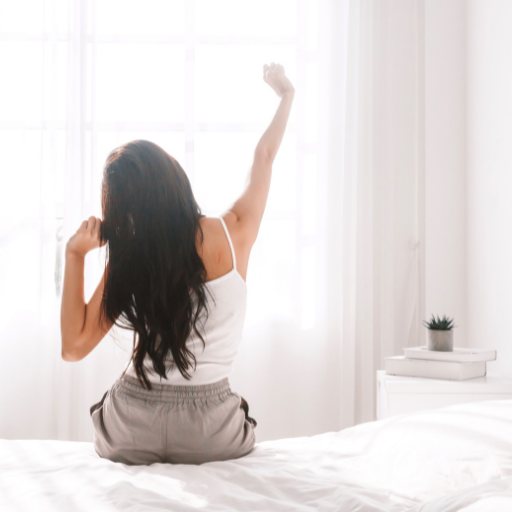What happens to the body while sleeping: REM and non-REM sleep explained
What happens to the body while sleeping: REM and non-REM sleep explained
A busy daily life may result in difficulty getting enough sleep. Sleeping problems are very common in Australian adults, with 4 out of 10 not getting enough good sleep at night (1).
Not all people require the same number of hours of sleep. However, the average amount needed for adults is around 7 to 9 hours of sleep each day (2).
Inadequate sleep might be caused by lifestyle factors that include work patterns, usage of applications and gadgets, or even environmental reasons such as noisy surroundings. Sometimes, it’s also caused by sleep disorders.
Read on to learn what happens to your body when you sleep, and how healthy practices, including taking ashwagandha for sleep, can help you.
What happens to your body when you sleep?
When we fall asleep, the body has the opportunity to rest and relax. The muscles are not in action, and consciousness is suspended. However, brain waves remain active while asleep.
The body’s circadian rhythm, also referred to as the internal body clock, controls when you begin to feel awake or sleepy. Whenever the body’s circadian rhythm becomes disrupted or shifted, this can induce sleep problems and inability to get into deep sleep.
REM and non-REM sleep
What happens to your body when you sleep includes two phases: rapid eye movement sleep (REM) and non-rapid eye movement (non-REM) sleep (3).
During the non-REM sleep cycles, the body goes through 4 stages. In the first stage, the body begins to shift between wakingness and sleep, where even the slightest movement can easily wake you up. As it moves forward to the next three stages, eye movement begins to drop, and stop. The body temperature lowers and you begin to fall into a deeper sleep.
During the REM stage, the eyes move rapidly. The heart rate may go up, along with your blood pressure, which is where the brain becomes very active even while asleep. REM sleep is the kind where dreaming happens. During this period, the body learns and creates new memories.
The body switches between the two phases throughout a whole night’s worth of sleep. Adults tend to spend a fifth of their night sleeping in the REM phase, with the remaining hours spent in non-REM sleep.

What happens to your body when you do not get enough sleep?
When you restrict yourself from getting enough sleep or resting, it can have many negative impacts on your health, particularly to your immune system (4). These problems can be either short-term or long-term.
A person’s ability to function properly depends on how much sleep they are getting (5). If you aren’t able to get enough sleep, or if you have frequent light sleep, or sleep at the wrong times, there’s a higher chance that you’ll feel more tired when awake. This means you might feel less alert, less awake, and more groggy or absent.
Sleep deficiency interferes with your daily routine. It can affect your quality of work and how you interact socially. A lack of sleep may affect cognitive functions such as learning, reacting, and focusing. It also affects your emotions, making you irritable and cranky, or anxious when exposed to social situations.
Even a few hours of lost sleep can significantly impact a person. Sleep deficiency can have the following major impacts:
- Short-term memory loss
- Poor judgement
- Reduced awareness and judgement
- Difficulty concentrating
- Lack of motivation
- Microsleeping, which is falling asleep involuntarily between minutes or hours
- Heightened emotions
- Moodiness, irritability, or shortened temper
- Reduced efficiency and productivity
How to improve sleep deficiency
Now that you know what happens to your body when you sleep, there are a few things you can do when trying to “fix your body clock,” even with a busy lifestyle. These strategies can help step-by-step in solving sleep deficiency:
Remembering the importance of sleep
Think of sleep on a level of importance as taking medicine or drinking water. Finding time to sleep can be hard, but it can help if you think of time to sleep as a complete necessity.
Working, learning and memory based activities, and trying to have a proper lifestyle are a few main causes why we lose sleep. Sleep drops far down our list of priorities because of responsibilities and wants, but it would be worth noting that without proper rest, we may not be able to achieve much at maximum capacity.
Waking up consistently
Waking up at the same time every single day can train your body to think of that specific time as the start of your day. As it continues, your body will naturally feel sleepy at a certain time at night.
Avoid using your phone before going to sleep
Nights are for resting and sleeping, which is why you should try to maximise the time you have on hand for doing things that help you relax. Social media, gadgets, and the like can keep you awake more than it can help you feel sleepy. Try to read a book, take a hot shower or bath, or perform a relaxing exercise before going to bed.
Developing relaxing practices and habits before going to sleep makes the body think that you’re tired and need to rest. Associating these relaxing activities with sleep makes it easier to achieve a proper circadian rhythm.

Try supplementation
Certain supplements may help you in relaxing and getting more sleep. Among these is ashwagandha, a herb that can be taken as tea, or as a supplement.
Taking ashwagandha for sleep supports quality sleep at night. Ashwagandha has been found to promote the body’s response to stress (6). In doing so, it is capable of relieving symptoms of mild anxiety. Ashwagandha has also been found to reduce the time it takes to fall asleep.
A lack of sleep can lead to stress and irritability. Finding ways to relax can be difficult, which is where a vitamin subscription may help. Alongside a healthy diet, include ashwagandha in your daily vitamin packs, which are made up only of the custom vitamins that are right for your needs. Try Vitable vitamins, and make use of our vitamin delivery anywhere in Australia today
References:
1. Deloitte. Exhibit 2b: Asleep on the Job: Costs of Inadequate Sleep in Australia. Published 2017 on https://www.sleephealthfoundation.org.au/news/special-reports/asleep-on-the-job-costs-of-inadequate-sleep-in-australia.html. Accessed on September 25, 2021.
2. Healthdirect. Sleep. Healthdirect. Published August 2020 on https://www.healthdirect.gov.au/sleep. Accessed on September 25, 2021.
3. South Australia Health. Getting enough sleep. South Australia Health. Published September 2021 on https://www.sahealth.sa.gov.au/wps/wcm/connect/public+content/sa+health+internet/healthy+living/healthy+sleep/getting+enough+sleep. Accessed September 25, 2021.
4. Australian Parliament House. 2. Insufficient Sleep. Australian Parliament House. Published 2019 on https://www.aph.gov.au/Parliamentary_Business/Committees/House/Health_Aged_Care_and_Sport/SleepHealthAwareness/Report/section?id=committees%2Freportrep%2F024220%2F26953#footnote2target. Accessed September 25, 2021.
5. National Institutes for Health. Sleep Deprivation and Deficiency. National Institutes for Health. Published 2021 on https://www.nhlbi.nih.gov/health-topics/sleep-deprivation-and-deficiency. Accessed September 25, 2021.
6. Vitable. Ashwagandha Plus. Vitable. Published (n.d.) on https://research.vitable.com.au/ashwagandha-plus. Accessed October 2, 2021.
